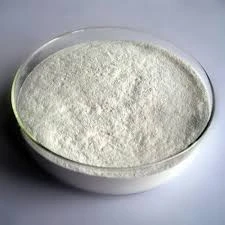
Nov . 13, 2024 16:05 Back to list
hpmc products
Understanding HPMC Products and Their Applications
Hydroxypropyl Methylcellulose (HPMC) is a versatile cellulose ether derived from natural cellulose. It has gained significant attention across various industries due to its unique properties, including solubility, thickening, and film-forming capabilities. HPMC is non-toxic, biodegradable, and offers excellent compatibility with various substances, making it an ideal choice for many applications.
What is HPMC?
HPMC is synthesized through the modification of cellulose. The process involves treating cellulose with propylene oxide and methyl chloride, which introduces hydroxypropyl and methyl groups into the cellulose structure. This modification enhances the solubility of cellulose in water and presents a range of desirable features such as viscosity, gel formation, and adhesive properties. The product is usually a white or off-white powder that is odorless and tasteless, present in various grades suited for different uses.
Applications of HPMC
1. Pharmaceuticals
One of the primary applications of HPMC is in the pharmaceutical industry. It is widely used as a binder and film-former in tablet formulations. HPMC enhances the mechanical properties of tablets, ensuring they maintain their integrity during storage and handling. Additionally, it serves as a controlled-release agent that allows for the gradual release of active pharmaceutical ingredients, leading to improved therapeutic effectiveness and patient compliance.
2
. Food IndustryHPMC is also prevalent in the food sector. It is utilized as a thickening and stabilizing agent in various food products. It helps improve mouthfeel and texture in sauces, dressings, and dairy products. Furthermore, HPMC is often used as a fat replacer, allowing manufacturers to produce lower-fat versions of popular items while maintaining a desirable consistency.
hpmc products

3. Construction
In the construction industry, HPMC acts as an essential additive in cement-based formulations. It enhances the workability, adhesion, and water retention of mortars and plasters. This results in improved application properties and extends the open time of the mixtures, allowing for better performance and durability of construction materials.
4. Personal Care
In the personal care sector, HPMC is used in products such as lotions, creams, and shampoos. Its thickening properties contribute to the desired texture and consistency of these products. Furthermore, HPMC can act as a stabilizer in emulsions, preventing the separation of oil and water phases, which is crucial for maintaining the quality and efficacy of cosmetic formulations.
5. 3D Printing
Emerging applications of HPMC include its usage in additive manufacturing or 3D printing. Its film-forming properties and ability to provide viscosity control make it an excellent candidate for creating filaments and pastes used in various 3D printing technologies. HPMC can improve the structural integrity of printed objects while offering design flexibility.
Conclusion
HPMC products have proven indispensable in numerous industries due to their multifunctional properties and versatility. From pharmaceuticals to food and personal care, HPMC enhances product performance, texture, and stability. As industries continue to evolve, the demand for HPMC is likely to grow, leading to innovations in its applications and formulations. Whether you're in health care, construction, or the food sector, understanding and utilizing HPMC can lead to improved product outcomes and consumer satisfaction. As scientific research continues to unveil more about this remarkable compound, the future of HPMC products looks promising, presenting vast opportunities for growth and development across various fields.
-
tile-bonding-additives-for-stronger-bonds
NewsAug.22,2025
-
construction-grade-rdp-for-wholesale-needs
NewsAug.22,2025
-
trusted-wholesale-hec-partners
NewsAug.22,2025
-
hec-solutions-for-industrial-excellence
NewsAug.22,2025
-
construction-additives-need-hpmc-essentials
NewsAug.22,2025
-
hpmc-versatile-cellulose-ether-for-industries
NewsAug.22,2025







